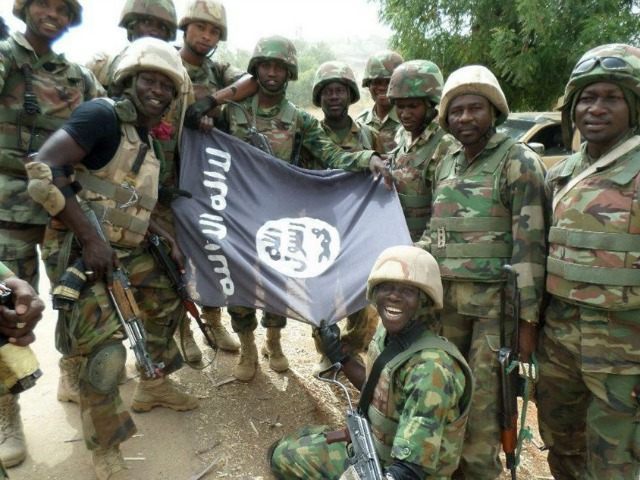The Nigerian military has issued an offer to Boko Haram jihadists seeking to surrender to hand over their arms and join the nation’s first jihadi rehabilitation camp, where the government hopes to train the former terrorists to work and prepare them to reintegrate into society.
The Nigerian military under President Muhammadu Buhari has escalated its efforts against the Islamic State-affiliated terrorist group in the past year, weakening the group’s organization but failing to stamp out acts of violence in the nation’s northeast, where Boko Haram is headquartered. Nigeria has also managed to corner many Boko Haram terrorists in the Sambisa forest of Borno State, cutting off food and fuel supplies and forcing starving jihadis to surrender.
To handle all the new surrenders, Nigeria announced “Operation Safe Corridor” on Wednesday, a plan to encourage Boko Haram members to abandon the group. According to Acting Director of Defence Information General Rabe Abubakar, the project will focus on “rehabilitating and reintegrating the repentant and the surrendering Boko Haram members back into normal life in the society.” Those who surrender will be placed in a rehabilitation camp where they will be taught trade skills and socialized before being set free. Fox News notes that Abubakar did not offer many specifics regarding the camp other than offering vocational training. He did issue an appeal to fighters to take the opportunity to leave the group.
“The reluctant Boko Haram members should therefore see wisdom in surrendering now, thereby saving themselves from the imminent calamity that is about to fall on them in the event of the military mop-up if they continue in their unwholesome acts,” he urged, warning that the Nigerian military still had prepared “the final onslaught against the remnant group of the terrorists would continue unabated and would not relent until the power of evil forces in the northeast is completely neutralized.”
Nigeria’s Punch reports that Abubakar puts the number of surrendering jihadis at 800 in the last three weeks. In the last month, the Nigerian Army claims it has freed 11,595 Boko Haram hostages. As Boko Haram often abducts young women and children to later indoctrinate them and use them as suicide bombers, many of those freed will also require psychological care and de-indoctrination.
While Boko Haram has not lost its ability to use female hostages as suicide bombers and carry out raids on remote villages, there are signs that the group is in severe organizational disarray. Indicative of this is the recent surfacing of a video featuring the head of Boko Haram, Abubakar Shekau, claiming he would be abandoning is life of jihad. “For me, the end has come,” a man identifying himself as Shekau claims in the video, which experts note is of low production values and does not resemble Boko Haram propaganda created after the group pledged allegiance to Islamic State caliph Abu Bakr al-Baghdadi.
Last week, a second video surfaced, more closely resembling the post-ISIS Boko Haram aesthetic, featuring masked soldiers asserting there will be “no surrender” and Boko Haram is as strong as ever. The date of neither video is known. Adding to the confusion was a public statement by a northern Nigerian political group accusing the men in the video of being “paid actors” for a con artist group attempting to swindle the Nigerian government out of ransom money.
While Boko Haram appears weakened (if not defeated), the victims of the terrorist group alleged the government has done little to help them restart their lives. In Chibok, the village where Boko Haram abducted 219 girls in April 2014, residents say the government has done nothing to rebuild the school the group attacked, and protests that none of the abducted girls have been rescued — while some made it back to their families, they were a minority who chose to jump out of moving trucks and flee in the immediate aftermath of the raid.
“Education here in Chibok has really come to zero level. This is the only school we have in Chibok and it has been destroyed,” Ayuba Alamson Chibok, a village elder, told Agence France-Presse earlier this week. AFP notes that the sign above the girls’ school is still missing the word “girls,” and there is no other education in the village. “If the government wanted to do something, let them call the contractor… to put somebody on the ground,” the elder protested.
A report published in the UK Independent last month suggests that Western intelligence sources had found the Chibok girls shortly after their abduction, but did nothing, unable to formulate a plan of attack that would liberate the girls with minimal civilian casualties. There are currently no indications of their whereabouts. A glimmer of hope surfaced last month when a would-be girl suicide bomber surrendered to authorities claiming to be a Chibok girl, but was found to be lying, as she was too young to have been attending the school and appeared not to have any Western education, only Koranic study. Many of the Chibok victims were Christians.

COMMENTS
Please let us know if you're having issues with commenting.